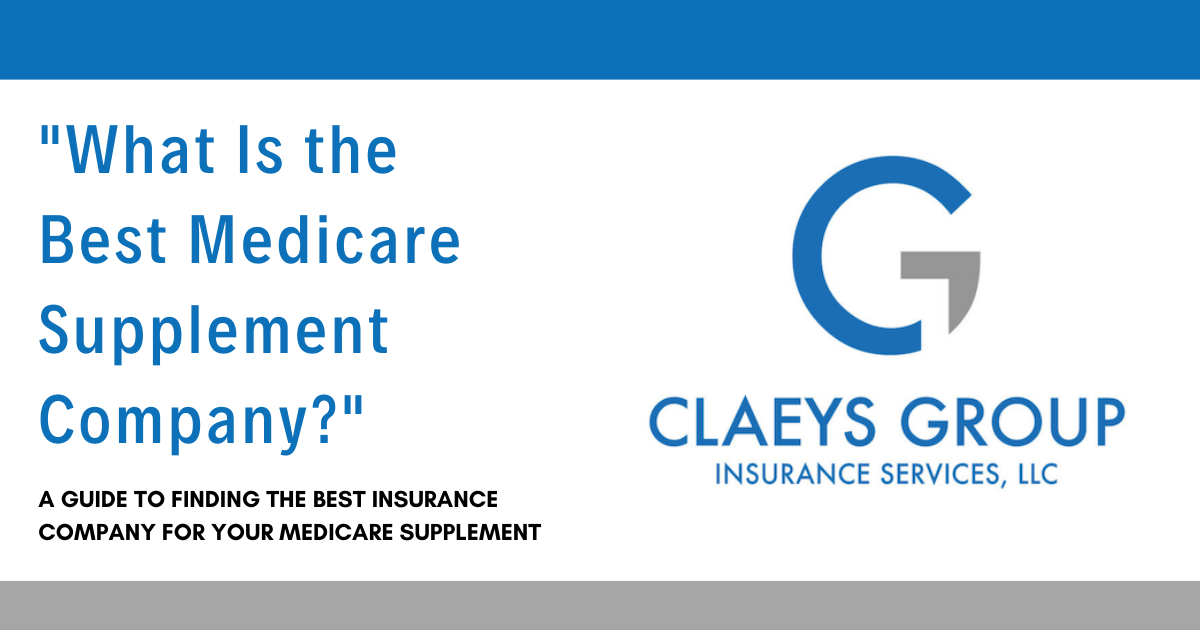
The Best Insurance Company?
From time to time, when I meet with prospective clients to help them get the best Medicare coverage for the lowest rate, someone will announce something like: “I have been told that [fill in the blank] is the best insurance company for a supplement.” Or, “My friend told me I need to get a Medicare supplement with [fill in the blank, again], because he has that [insurance] company and hasn’t had to pay any medical bills.”
Interestingly, each time I hear that similar story, the insurance company changes. One time it might be United Healthcare, the next time it might be Aetna, then it might be Cigna, etc. So, which IS the best insurance company when it comes to a Medicare supplement?
The simple answer is: There is NO best insurance company when it comes to a Medicare supplement. Why is that? I’m glad you asked.
Medicare in Control
The reason is because of Medicare. First of all, Medicare has designed the supplements, but has handed them over to private insurance companies to administrate and to sell them. When a private insurance company, such as Cigna, Aetna, etc. agrees to administrate a Medicare supplement, no change can be made to that supplement—not in the benefits of the plan, not in the way the company pays on those benefits, not on anything! This means that a supplement, such as Plan G, will work EXACTLY the same no matter what insurance company handles that plan.
Second, Medicare is in control of Medicare coverage, not insurance companies. When someone has Medicare and a Medicare supplement, it is Medicare that determines what is covered, not the insurance company that handles your supplement. Medicare coverage is one area where insurance companies are NOT in control. So, on a medical charge, when Medicare approves that charge (meaning Medicare will cover it), the supplement automatically follows. In that case, the supplement will simply fill in the Medicare coverage gaps, outside of any deductible, etc. associated with that supplement. (For example, Plan G uses the Medicare Part B deductible as its annual deductible, which, in 2025, is $257. Once that deductible is met on Medicare Part B charges, the supplement picks up the rest of any covered Medicare charges.) Thus, the same supplement will work in the exact same way, no matter what insurance company administrates it.
Same Medicare Plan, Same Medicare Coverage
So when someone states that the insurance company they have for their supplement is the best because they have not had to pay anything on their medical charges, it is simply because of the plan they have, not because of the insurance company they have. If someone has not had to pay any medical bills, including a doctor’s office charge, it is simply because they have Plan F (and the charges have been covered by Medicare). Plan F will work EXACTLY the same, no matter what insurance company administrates it (as long as the charges are approved by Medicare). So, if the standard of the greatness of the insurance company for someone is that of paying no medical expenses, then every insurance company administrating a Plan F could be considered great.
The Two Differences Between Insurance Companies
The only real differences between insurance companies that handle Medicare supplements are twofold:
- First, the premium on any given supplement, such as Plan G, can vary from one insurance company to another. In fact, the variation on premium can be significant.
- Second, rate increases can also vary from one insurance company to another. In fact, the rate differences can be considerable, such as a low of around 3 or 4% to a high of 25% (or more). Thus, an insurance company could initially offer a Plan G supplement at the lowest rate, but in two or three years that same company could be charging much, much more!
So, what seemed to be a good choice initially—by purchasing a supplement with that company—could end up being a poor financial choice later.
Why the Rate Increase History Makes a Difference
Why should you be concerned about the rate increase history of a company? After all, if the premium increases, can’t you just change insurance companies? The answer to that second question also answers the first one.
After you pass the initial open enrollment period for a supplement (which expires six months after the month in which you turn 65), you can switch to a supplement with another company, but only if you can health-qualify. That means that certain health conditions, or a combination of other health conditions, could keep you from moving off of your current supplement.
This is what makes your choice of supplement companies critical. If you make the wrong choice—with a company having a history of exorbitant rate increases—you may could end up being stuck
with outrageous premiums down the road. Though past performance does not necessarily determine future results, it can be a very good guide of how your supplement premium will perform in the future.
What This All Means for You
So what does this all mean for you? It means that, when you are shopping for a supplement, don’t fall for the myth that one insurance company is better than another. As we have seen, a Medicare supplement will work the same from one company to another.
Second, though one of the two key differences on a supplement from one insurance company to another, it would be wise to not just go with the company that has the lowest premium. For, as we have also seen, rate increases will definitely figure into the determination of what you will pay down the road. Therefore, shop with an insurance agent who can show you companies that, not only have the lowest premiums, but also have a low rate-increase history. If you choose wisely in that regard, your wallet will thank you in the future.
What Is the Best Medicare Supplement Company?
So, what is the best Medicare supplement company? It is the company that will save you the most money—both now and in the future.















































